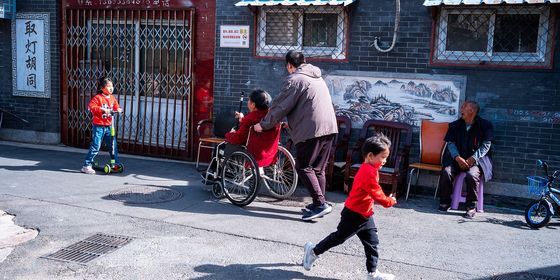How to spot a capitalist collaborator
With the end of the Lunar New Year, people all over China have trudged back to work. Struggling to overcome their so-called “holiday syndrome,” many try to motivate each other by saying: “Soldier on, workers (加油, 打工人 Jiāyóu, dǎgōngrén)!”
打工人 is just the latest trendy, self-deprecating label that young Chinese office workers have assigned themselves, following “996 (jiǔ-jiǔ-liù, working from 9 a.m. to 9 p.m., six days a week),” “corporate livestock (社畜 shèchù),” and “overtime dog (加班狗 jiābāngǒu).” Just like the language of workers’ struggle that formed the basis of the older generation’s political education, these buzzwords indicate young workers’ growing dissatisfaction with excessive stress, unpaid overtime, and other injustices in the workplace.
These memes sometimes even turn into action, with 打工人 exposing mistreatment by employers on social media, or sharing tips for protecting one’s rights and how to take legal action.
However, it’s not easy to unite the workers: Some just won’t join the revolutionary ranks, even if they suffer from the same oppression as all other 打工人. Though these individuals have never possessed any capital themselves, they seem to sympathize with employers rather than fellow proletariat, and find excuses for all that the company does. Thus, they are called “spiritual capitalists (精神资本家 jīngshén zīběnjiā)” by netizens.
Spiritual capitalists are everywhere in daily life. They could be your supervisors, colleagues, or well-meaning parents and teachers, who fob you off with platitudes or tell you to “hang in there” when you complain about work. Middle managers are likely to develop spiritual capitalism: Perhaps they get a sense of ownership after years of working in a business, and the meager power they hold makes them feel that they are no longer an ordinary laborer, but a potential boss.
A spiritual capitalist is usually easy to spot by how they act or talk. First of all, they never admit that a business pays its employees because workers create value: Rather, it’s because the company is being generous, and the employees should be grateful in return:
You should thank your company that you didn’t lose your job during the Covid-19 pandemic.
Yìqíng qījiān hái méiyǒu shīyè, nǐ yīnggāi gǎnxiè nǐ de gōngsī.
疫情期间还没有失业,你应该感谢你的公司。
To be frank, as a new graduate, the company didn’t expect you to make any real contributions. You’re lucky to have been able to get this job, and should work hard to repay the company in the future.
Tǎnbái jiǎng, nǐ jīnnián cái gāng bìyè, gōngsī bìng bù zhǐwàng nǐ zhēn néng yǒu shénme gòngxiàn. Néng dédào zhè fèn gōngzuò shì nǐ de xìngyùn. Nǐ yīnggāi nǔlì gōngzuò, yǐhòu huíbào gōngsī.
坦白讲,你今年才刚毕业,公司并不指望你真能有什么贡献。能得到这份工作是你的幸运。你应该努力工作,以后回报公司。
Another hallmark of spiritual capitalists is that they will often invoke “classic business sayings (商业金句 shāngyè jīnjù),” well-known quotes about business by tycoons and entrepreneurs, to bolster up their argument―never mind that these sayings often come from millionaires who are completely out of touch with ordinary workers’ lives. Jack Ma, the founder of the Alibaba Group, once called 996 “a blessing for employees (员工修来的福报 yuángōng xiūlái de fúbào),” and stated:
In many companies, there are those who want to do 996 but never have the chance. If you don’t do 996 when you’re young, when will you do it?
Hěnduō gōngsī、hěnduō rén xiǎng jiǔ-jiǔ-liù dōu méiyǒu jīhuì. Rúguǒ nǐ niánqīng de shíhou bù jiǔ-jiǔ-liù, nǐ shénme shíhou kěyǐ jiǔ-jiǔ-liù.
很多公司、很多人想996都没有机会。如果你年轻的时候不996,你什么时候可以996?
Though many workers probably wouldn’t mind more hours if given extra pay, spiritual capitalists will imitate sayings like Ma’s to argue that employees should work overtime for no extra reward:
“996 is a blessing.” The company is giving you an opportunity to grow and develop.
“Jiǔ-jiǔ-liù shì fúbào.” Gōngsī shì zài gěi nǐ chéngzhǎng hé jìnbù de jīhuì.
“996是福报。” 公司是在给你成长和进步的机会。
Sometimes, they will add folk sayings to make their argument sound more persuasive:
“Idle when young, and beg when old.” Youth should be a time to strive for your dreams. The first few years are a learning process for you, and you don’t even have to pay tuition, so you should cherish every opportunity.
“Shàozhuàng bù nǔlì, lǎodà tú shāngbēi.” Niánqīng de shíhou jiù gāi wèile mèngxiǎng fèndòu a! Yì kāishǐ de jǐnián duì nǐ lái shuō shì yí gè xuéxí guòchéng, hái búyòng jiāo xuéfèi, nǐ yīnggāi zhēnxī jīhuì.
“少壮不努力,老大徒伤悲。” 年轻的时候就该为了梦想奋斗啊!一开始的几年对你来说是一个学习过程,还不用交学费,你应该珍惜机会。
But if your overtime work doesn’t produce good results, spiritual capitalists will immediately throw away these “work to learn” theories. Whether it’s because the company didn’t give you enough support, or due to events outside of your control, they will argue that the worker should take all responsibility for failing to meet their objectives, and the company is perfectly within their rights to slash the employee’s bonus or salary:
The company is not a school, and you are no longer a student. As a professional, you should take responsibility for your own actions and not look elsewhere to assign blame.
Gōngsī bú shì xuéxiào, nǐ yě bú shì xuéshēng le, zuòwéi yí gè zhíchǎngrén, nǐ yīnggāi xuéhuì wèi zìjǐ zuò de shì fùzé, búyào zhǎo kèguān lǐyóu.
公司不是学校,你也不是学生了,作为一个职场人,你应该学会为自己做的事负责,不要找客观理由。
A company is not a charity. You should reflect on yourself and catch up with the pace of the company.
Lǎobǎn kāi gōngsī yě bú shì zuò císhàn de. Nǐ yīnggāi fǎnsī yíxià zìjǐ, gēnshàng gōngsī de jiézòu.
老板开公司也不是做慈善的。你应该反思一下自己,跟上公司的节奏。
And even when the company does something bad enough to make headlines, there are still some who will rally to their defense on social media. If a company forced their employees to work overtime but slashed the year-end bonus, they will say:
Our performance wasn’t good this year. It’s a hard time for the whole company. As an employee, you should pay attention to the interests of the whole and take a longer view. Only when the company develops well can its employees develop well.
Jīnnián xiàoyì bù hǎo, gōngsī yě hěn kùnnan. Zuòwéi yuángōng yào yǒu dàjúguān, yǎnguāng yào chángyuǎn. Gōngsī fāzhǎn de hǎo, yuángōng gèrén cáinéng fāzhǎn de hǎo.
今年效益不好,公司也很困难。作为员工要有大局观,眼光要长远。公司发展得好,员工个人才能发展得好。
And if the products are found to have quality issues:
No one is perfect!
Rén fēi shèngxián, shú néng wú guò!
人非圣贤,孰能无过!
If a company refuses to hire anyone over 35—as is commonly reported in the tech industry—spiritual capitalists won’t admit it’s ageism. Instead, they will say it’s the rule of the market:
The workplace is about survival of the fittest. Young people accept lower pay for the same work you do, so why wouldn’t the company lay you off?
Zhíchǎng jiùshì shìzhě shēngcún, gàn yíyàng de huór, niánqīngrén yào de gōngzī bǐ nǐ dī, nà gōngsī wèi shéme bù cáidiào nǐ?
职场就是适者生存,干一样的活儿,年轻人要的工资比你低,那公司为什么不裁掉你?
And when this grueling regime leads to headlines about women being fired for getting pregnant, or a young programmer dying of a heart attack after continuously working 12-hour shifts, spiritual capitalists might comment under the article:
It’s the same in every company. You’re just angry because you’re not mature enough.
Zhè zhǒng shì nǎlǐ dōu yíyàng, nǐ zhème shēngqì zhǐnéng shuōmíng nǐ háishì bù chéngshú.
这种事哪里都一样,你这么生气只能说明你还是不成熟。
Though spiritual capitalists are criticized and hated by laborers, some point out that they are also the victims of today’s workplace culture. Last year, netizens coined the term “workplace PUA (职场 PUA zhíchǎng PUA)” to describe the tactics used by companies to psychologically control their employees. Like an emotionally abusive “pick-up artist,” a company might hint at a promotion, subtly threaten to derail an employee’s prospects, or gaslight workers into believing that their lack of career growth is their own fault—all in order to undermine the worker’s confidence and keep them loyal to the company.
Maybe all of these spiritual capitalists were once ordinary workers, gradually brainwashed into parroting the “live to work” doctrine. Maybe they are afraid to join in their colleagues’ complaints because they don’t want to lose their own job. Or maybe they’ve been part of this cutthroat system for too long to remember to have empathy for their fellow workers. Regardless, it may be time to remind them of this new spin on a classic saying:
Workers of the world, unite! You have nothing to lose but your overtime!
Quán shìjiè dǎgōngrén liánhé qǐlái! Nǐmen shīqù de zhǐshì jiābān!
全世界打工人联合起来!你们失去的只是加班!
Like a Boss is a story from our issue, “Dawn of the Debt.” To read the entire issue, become a subscriber and receive the full magazine.












